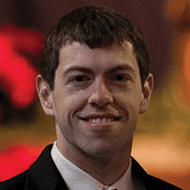TDC member Doug Dluzen interviews Jonathan Kocarnik, ASHG Social Issues Committee Postdoctoral Fellow and Research Associate, Fred Hutchinson Cancer Research Center/University of Washington
August 2016

ASHG: Please tell us a bit about yourself.
Dr. Kocarnik: I grew up in the Pacific Northwest and I currently live in Seattle, WA. My education took me to the University of Notre Dame, where I earned a dual Bachelor’s degree in Anthropology and Pre-Medicine and a minor in Theology. I earned a Master’s in Public Health at the Oregon Health and Science University, with a focus on biostatistics and epidemiology, before I completed my PhD in Public Health Genetics at the University of Washington. After my PhD, I did a postdoc in cancer epidemiology at the University of Washington and the Fred Hutchinson Cancer Research Center. I am now a KL2 clinical research scholar at UW and a Staff Scientist at Fred Hutchinson. My current research involves cancer epidemiology with a primary focus on colorectal incidence and survival, genetic epidemiology in multiethnic populations, and the impact of pleiotropy on the communication of genetic information.
ASHG: How did you first get interested in genetics?
Dr. Kocarnik: I first got interested in genetics in my high school biology class, where I was fascinated with how the whole genetic system worked to encode biological processes, phenotypes, and disease. The Human Genome Project was in full swing, and things like the cloning of Dolly and the movie Gattaca further piqued my interest, especially with respect to all the related ethical and philosophical considerations. All of this helped plant the seeds for my career and today I remain particularly interested in how genomic information is integrated into medicine, public health, and society.
ASHG: What trends in genetic research do you think will have the most social impact in the next five years?
Dr. Kocarnik: The pace of genetic research right now is incredible and it’s certainly an exciting time to be in science! Several areas seem destined to have a strong impact, including gene editing, immunotherapy, and cell-free DNA, which is particularly important in pregnancy and oncology settings. Some of these technologies and treatments may require social decision-making on appropriate uses and imitations of the uses of this technology. Any social impact in the next five years will likely only be the tip of a very large iceberg.
ASHG: Can you describe your experience on the ASHG Social Issues Committee?
Dr. Kocarnik: I’ve been the trainee member on ASHG’s Social Issues Committee since 2014. I thought this would be a good opportunity to get involved and see some of the inner workings of ASHG. In this role, I’ve done such things as review past society statements and positions on various social and ethical issues, consider them in the context of recent developments, and suggest whether they should be archived or updated. It has been a fun experience for me.
ASHG: What are your hobbies outside the lab and ASHG?
Dr. Kocarnik: I mostly spend time with my wife and two young kids, which involves a constantly changing flurry of activities and logistics. We especially enjoy traveling, outdoor activities, and visiting family and friends. As the kids get older, I’m hoping to share my old hobbies like biking, sailing, skiing, and snowboarding.
ASHG: Do you have any career advice for other ASHG trainees?
Dr. Kocarnik: I suggest taking advantage of as many trainee opportunities as you can (especially at the Annual Meeting) and to make sure you introduce yourself and talk to people as you do so. Ask questions, learn about other areas, and explore what excites you!
